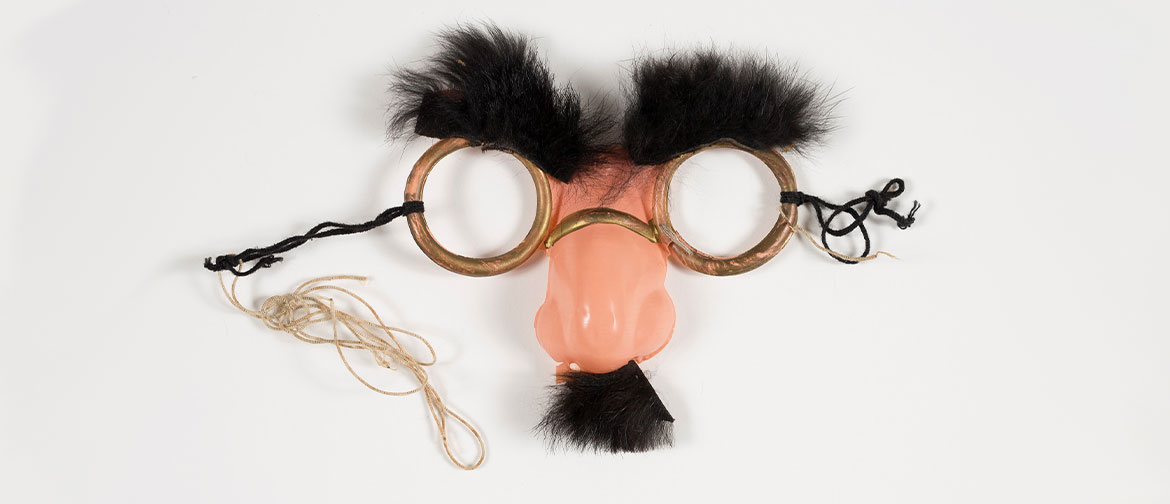Groucho glasses, c. 1940s, gift of Patricia Keiller, Te Manawa Museums Trust, 97/64/8
Seeing these spectacles brings back memories of Groucho Marx: comedian; vaudevillian; movie and stage actor; singer and author. Growing up in New Jersey, I looked forward to watching You Bet Your Life on our black and white television. His wisecracks and off-handed repartee with guests on this quiz show always made me laugh. Groucho’s appearance was honed during his years in show business to become probably the most easily recognised face on American television. As television came late to New Zealand, it was possibly his movies that enamoured him to audiences of all ages here. Children loved his antics and humour, particularly his ‘chicken-walking’ posture.
The ‘Groucho glasses’ mimic Marx’s facial features: bushy eyebrows, large nose, round or horn-rimmed frames, bushy moustache, and often a stubby cigar. Patricia Keiller, the Palmerston North-based donor of the glasses, remembers herself and her brothers playing with them in the 1940s when they were very young. Classified in museum parlance as a ‘recreational artefact’, the glasses are a toy mask created to appeal to children who enjoyed dressing up and pretending to be Groucho Marx or a character of their own imagination. The mask let them create a mad scientist, a doctor or even a grandfather figure. Grownups may have used a pair of these glasses for costume parties and other forms of silliness, where they too enjoyed copying the antics of the famous comedian.
Anyone can be a ‘Groucho’
Groucho glasses are a ‘humorous novelty disguise’, a caricature of the stage makeup used by Marx in his movies, vaudeville performances and television appearances. Te Manawa’s example has the requisite bushy eyebrows over round gold frames, exaggerated plastic nose and the remains of a bushy moustache. Marx’s cigar (usually a plastic replica) is missing. The eyebrows and moustache are made of dyed rabbit fur. The mask is held on by elastic straps. Considered one of the most iconic and widely used of all novelty items in the world, Groucho glasses were marketed as early as the 1940s. Today they are still instantly recognisable to people throughout the world.
Marx – the man and comedian
‘Groucho’ Marx was born Julius Henry Marx on 2 October 1890 in Manhattan, New York. From the age of 15, he went on to become a comedian, actor, writer, singer and vaudeville performer, and was a stage, film, radio, and television star. As a ‘master of quick wit’, he is generally considered one of America’s greatest comedians.
Julius was the third born child of Miene ‘Minnie’ Schoenberg and Simon ‘Sam’ Marx, whose last name was originally ‘Marrix’. The family was Jewish of European origin, with mother Minnie from Dornum, Germany, and father Sam from Alsace, France. Groucho’s older brothers were Chico (Leonard) and Harpo (Arthur) and his younger brothers were Gummo (Milton) and Zeppo (Herbert). Groucho and his siblings were encouraged to use their talents in show business by their mother and her brother Al Schoenberg, who shortened his surname to Shean. He became half of Gallagher and Shean, a noted musical comedy duo of the early 20th century.
Groucho left school at 12 to help with family finances. In 1905 he got stage work as a boy singer with the Gene Leroy Trio. His mother had discovered his fine soprano voice and his ability to stay on key after she encouraged Chico to take piano lessons. Groucho was an avid reader who overcame his lack of formal education to write or co-author nine books.
Stage and film work
The Marx Brothers were at one time the biggest comedic stars on Broadway, which included three hit plays. Their stage work predated their Hollywood career; Groucho made 26 movies, 13 of which included his brothers Chico and Harpo. Their first movie was a silent film made in 1921, but never released. Ten years later the team made two of their stage hits, Cocoanuts and Animal Crackers, into movies. Other successful films included Monkey Business, Horse Feathers, Duck Soup and A Night at the Opera.
‘Say the secret word’
Groucho also worked as a radio host and comedian. In 1947, Marx was asked to host a radio quiz show called You Bet Your Life. First broadcast by ABC, it moved to CBS before moving to NBC. The show then moved to television in October 1950 and ran for eleven years. Filmed before a live audience, it featured Marx bantering with the contestants and ad-libbing jokes. Contestants were offered extra money if they said the ‘secret word’. Groucho would announce, ‘Say the secret word and the duck will come down and give you 50 dollars.’ Contestants who were not doing well were often rewarded for correct answers to questions like ‘Who’s buried in Grant’s tomb?’ and ‘What colour is the White House?’ as consolation prizes.
Groucho’s signature look
Without their trademark wigs and costumes, Harpo and Chico were hard for fans to recognise. The same was true of Groucho; he was a different man minus spectacles, fake eyebrows and moustache. Apparently, the greasepaint moustache and eyebrows came about when Groucho found himself short of time to apply the paste-on moustache. He added greasepaint to his own eyebrows to make them match the colour and bushy appearance of the moustache. This was to become his ‘signature’ look. As he never cared for the paste-on moustache, which was no fun to remove every night, the greasepaint solution remained. When the television version of ‘You Bet Your Life’ aired, Groucho had grown a real moustache which he had for the rest of his life.
Honouring Groucho
At the 1974 Academy Awards, Groucho Marx was presented with an Honorary Academy Award. He received a standing ovation from the audience. The award honoured Harpo, Chico and Zeppo as well. The citation read: ‘In recognition of his brilliant creativity and for the unequalled achievements of the Marx Brothers in the art of motion picture comedy.’ Although this was Groucho’s last major public appearance, his actual final appearance was a brief sketch with George Burns on a Bob Hope television special in March 1976. Groucho’s health declined and after being hospitalised with pneumonia he passed away at the age of 86 at the Cedars-Sinai Medical Center, Los Angeles, on 19 August 1977. His ashes were interred at Eden Memorial Park, Los Angeles. He was survived by his three children and his younger brother Zeppo who died in 1979. Media coverage of his death was sadly overshadowed by the sudden death three days earlier of Elvis Presley.[1]
Remembering Groucho
Groucho Marx was considered the most distinctive of the Marx Brothers. Groucho-like characters have appeared in popular culture during and after his lifetime. Even if you have never seen a Marx Brothers’ movie, play or television show, the Groucho glasses are unforgettable reminders of this uniquely talented individual.
Today Groucho glasses are icons of his singular show business career and may still be sold in novelty and costume shops worldwide. Until recently they were often a feature of two-dollar shops throughout New Zealand. If you find Groucho glasses that look like the ones in the museum’s collection – not the all-plastic version more commonly seen today – you should purchase them for your next costume party or for your children or grandchildren’s Halloween costume. The memories they hold for those of us who remember Groucho Marx will make you chuckle!
[1] There was a single newspaper obituary in New Zealand, see The Press, 22 August 1977, p. 9.
References
Marx, Groucho, Groucho and Me, Gollancz, London, 1959




